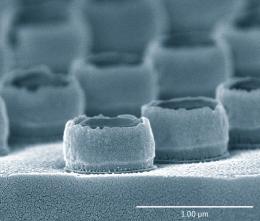Feb 16 2011
Wakana Kubo and Shigenori Fujikawa from the RIKEN Innovation Center, Wako, and the Japan Science and Technology Agency, have developed a nanostructure that will support plasmons across wide areas.
 RIKEN's gold double-nanopillar array
RIKEN's gold double-nanopillar array
The researchers built numerous structures having two nested vertical gold cylinders. The cylinders were placed at a distance of tens of nanometers. This ensuing double nanopillar could support a highly concentrated electric field in the space between the two cylinders, by responding to light reflected by the gold cylinders. The sensor was formed when the space between the cylinders was filled with either liquid or gas that changed the optical properties of the two cylinders.
The researchers deployed a template-based covering process to gold plate the cylinders. They carved a silicon wafer to create a mold of holes that were spaced apart, and applied it to a soft polymer film. This caused an array of pillars. These were painted gold, then with a spacer then again with gold. The polymer film and spacer layers were then removed, creating a double nanopillar array. This method was replicated with various spacer material of minutely controlled thickness.
The device was tested as a sensor of a refractive index that displayed sensitivities more than the sensors having similar metal surfaces, but without a space between them. This showed that the electric field in the double nanopillars was more concentrated.